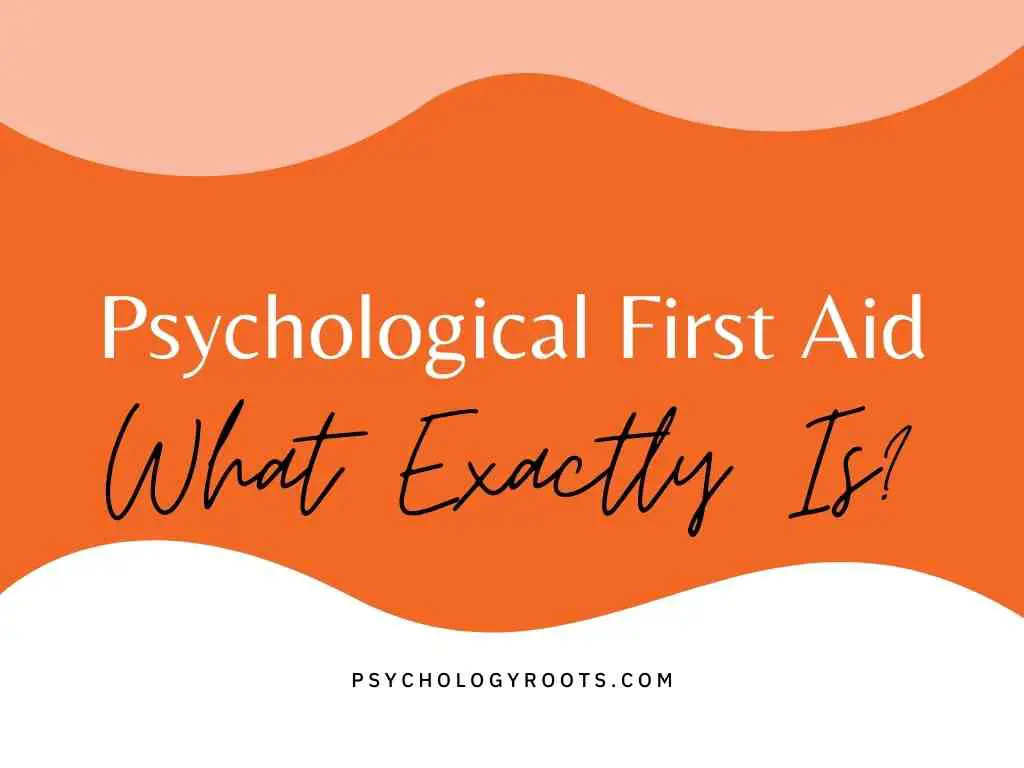Table of Contents
What Exactly Is Psychological First-Aid?
Here in this post, we are discussing “What Exactly Is Psychological First-Aid?”. The intervention’s purpose is to help those who have been affected by a traumatic incident cope better by providing them with security, stability, and resources. It is explained on this page how PFA is used, who does it, and what the consequences are. You can read more about psychology-related material on our website. Keep visiting Psychology Roots.
Early reactions to a stressful incident might lead to anxiety and impede with coping for certain people. The National Child Traumatic Stress Network and the National Center for PTSD have created a disaster relief strategy called “psychological first aid” (PFA) (post-traumatic stress disorder).

What Exactly Is Psychological First-Aid
What Does Psychological First Aid Mean?
PFA isn’t a treatment provided on-site. As a result, it engages with individuals in the immediate aftermath of a tragedy and provides them with resources and assistance. The eight main components of PFA are as follows:
- Making the first move
- Ensuring the safety and comfort of everyone
- Inducing calm and orientation in others
- Recognizing and responding to the current needs of others
- Providing aid in a practical way
- Enabling individuals to access the resources they need
- Educating them on how to cope
- establishing a connection between individuals and organisations to facilitate cooperative services
Professional mental health treatment is not provided by PFA. It is, in fact, often performed by non-professionals (i.e., persons without specialised training). PFA, on the other hand, is guided by specific conceptions of people’s coping requirements, such as:
- Need to feel secure, connected, and optimistic
- Access to help is essential.
- Self-reliance is a need.
History
In the mid-20th century, PSA was presented as a concept. Post-9/11, it became popular as an emergency response method. 60 mental health specialists met in 2001 to explore the psychological remedies for mass violence, after mass shootings at schools, workplaces, and terrorist acts. It’s been a long time since PFA hasn’t been an important part of the early response to disasters.
The phrase “psychological first aid” is the most often used to denote immediate emotional help after a traumatic experience. Other words, such as:
- Psychosocial assistance provided in the context of a neighbourhood
- First aid for mental health in a disaster
- First aid in the field of mental health
- First aid for stress
In what situations does it come into play?
People of all ages and genders may benefit from PFA, regardless of whether or not they have experienced a traumatic incident themselves. Crisis occurrences identified by the World Health Organization (WHO) potentially benefit from PFA include:
- Natural catastrophes
- War
- There have been several terrorist attacks.
- Outbreaks of disease
- Displacement
- Robbery
- Assault
People respond in similar ways to a disaster’s aftermath. A person’s long-term resilience may be improved if their acute stress is reduced by PFA. Among the most common responses to stress are:
- Confusion
- Fear
- Hopelessness
- Insomnia
- Pain
- Anger
- Grief
- Shock
- Guilt
Who Is Responsible?
Psychological first aid may be taught to anybody. People who are more likely to be in the area after a catastrophe use PFA because of this:
- Rescuers and medics
- Personnel in the medical field
- Emergency response teams at schools
- Organizations that help those affected by natural disasters
Its Mechanisms
There is no one-size-fits-all approach to providing Psychological First Aid (PFA). Why? Because every single case has its own set of circumstances. There are general responses to catastrophes, yet each person’s response is unique, as are their immediate requirements, despite the fact that there are similar replies.
Promoting the following is one of the skills taught to those with PFA training:
- Responders assist individuals in finding food, shelter, and medical care in an effort to keep them safe.
- It is important to have a calm demeanour while responding to people’s crises.
- Helping individuals find loved ones and keeping families together is one of the primary roles of first responders.
- Responders reassure them that assistance is on the way and provide them with information about services they may use.
- Recommendations for self-improvement are offered by respondents.
Isn’t It?”
None of these terms is used to describe PFA. Reassurance and advising individuals how they should feel or what they should do are not acceptable responses from responders.
Proving the efficacy of PFA
No scientific evidence supports the usefulness of PFA after catastrophes despite its widespread usage and marketing. Despite this, the technique is still regarded as based on sound scientific data (using current best practices in making decisions regarding the care of an individual).
Summary
In the early aftermath of a catastrophe, psychological first aid (PFA) is a kind of disaster relief response. People’s main stress may be reduced by connecting them with resources, reconnecting them with family and friends, and giving them hope that they will be better able to deal in the long run.
Anyone can learn PFA, and it’s a skill that’s critical to any job. First responders, medical personnel, and disaster relief workers need it more than anybody else. It is possible to take PFA training from a number of different sources. The American Psychological Association contains a list of training offered by different organisations if you’re interested in looking into it.
Help Us Improve This Article
Have you discovered an inaccuracy? We put out great effort to give accurate and scientifically trustworthy information to our readers. Please notify us if you discover any typographical or grammatical errors.
Make a comment. We acknowledge and appreciate your efforts.
If you have any scale or any material related to psychology kindly share it with us at psychologyroots@gmail.com. We help others on behalf of you.